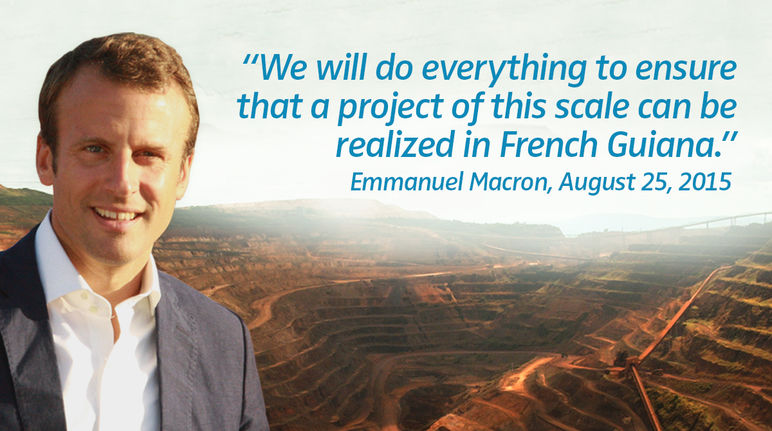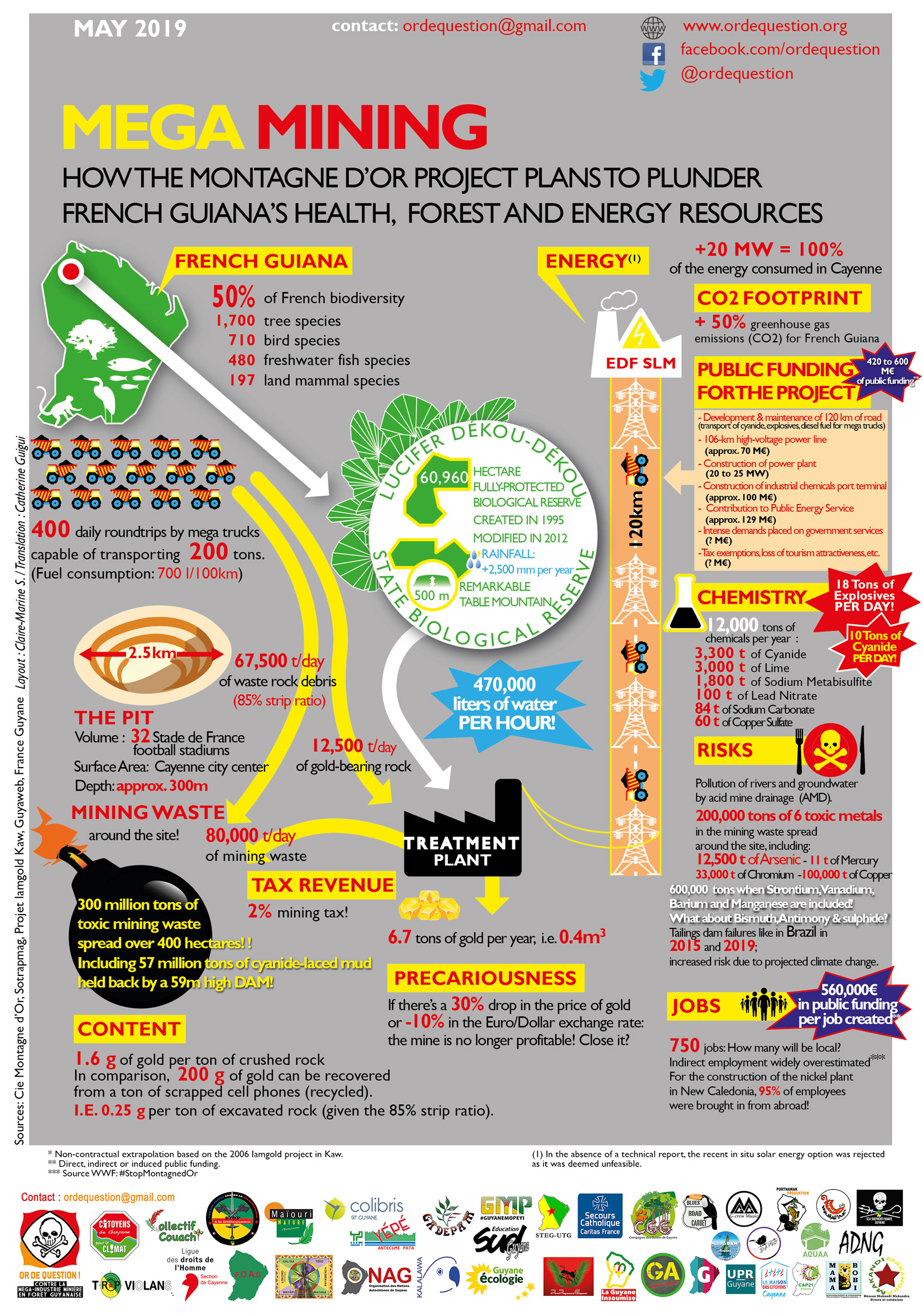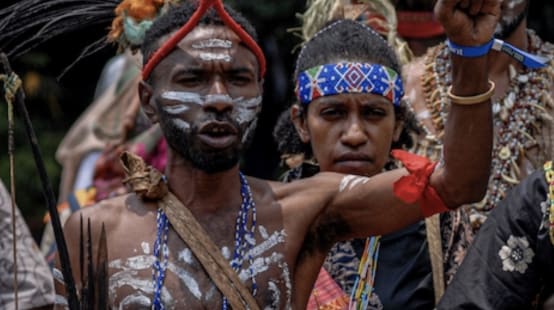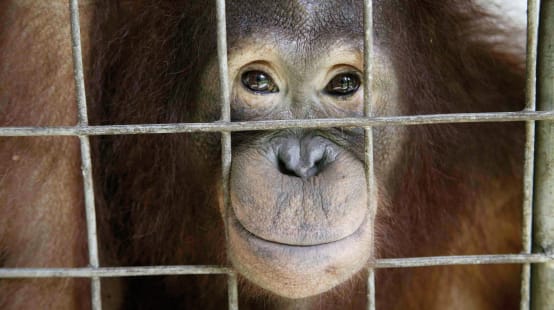Urgent! Please SIGN: NO gold mining in the rainforests!
 French President Macron has been advocating the gold mine since 2015. (© rights reserved - photomontage Sauvons la forêt)
French President Macron has been advocating the gold mine since 2015. (© rights reserved - photomontage Sauvons la forêt)
French President Macron wants to open French Guiana's rainforest to industrial gold mining. A Russian-Canadian consortium is ready to dig a vast open-pit mine pending the French government's approval. It is now up to Macron to give the project his final blessing. Tell him to reject this environmental disaster in the making!
Call to actionTo: the President and government of France
“Save the exceptional biodiversity of French Guiana! Speak out against Montagne d’Or and other industrial gold mining projects in the French overseas department.”
It would be an industrial hellscape: the “Montagne d'Or” project in the Amazon rainforest would cover a concession area of 190 square kilometers, with a pit 2.5 km long, 500 m wide and 400 m deep. The operation would dig up and crush 400 million cubic meters of rock, dowsing it in cyanide and other toxic chemicals to leach out tiny quantities of gold.
The greatest environmental hazard lies in the dammed storage of 50 million tons of cyanide sludge. Since 2000, at least 25 mining dam breaks have occurred around the world. In 2015, a dam collapse in Brazil caused one of the worst ecological disasters of all time, burying people and villages under millions of tons of toxic sludge and poisoning more than 1,000 kilometers of the Rio Doce river.
French Guiana is on the northeastern edge of the Amazon region. Much of the French overseas department is still covered by intact rainforest – the green lung of our planet and home to extraordinary biodiversity. It is crucial that we protect this ecosystem against such destructive activities.
If President Macron's government were to authorize this first mega gold mine, it would set a disastrous precedent for similar projects in the future and move French Guiana away from a path of sustainable development. The current plans were made without consulting the local population and disregard the rights of French Guiana's indigenous people.
The Or de question collective, an alliance of local and national NGOs, is calling on the French government to cancel the mega-mining project immediately. The French Guianan economy must move toward ecologically and socially sustainable development.
Please sign our petition and speak out against this potential ecological disaster.

SF SystExt press release:
FOR IMMEDIATE RELEASE

No to industrial gold mining in French Guiana!
The French government is quietly encouraging [1] multinational corporations to launch gigantic mining operations in the heart of the French Guiana forest. Among them, the “Montagne d'Or” project by the Russian-Canadian NordGold/Columbus Gold consortium is expected to start in 2018 [2]. It would be the largest gold mine ever established on French territory. Industrial gold mines are still the cause of serious and often irreversible human and environmental impacts [3]. We consider the destruction of a part of French Guiana’s exceptional biodiversity and taking the risk of major accidents to be unacceptable for the extraction of a material currently of secondary social and industrial utility. Our 18 organizations [4] are therefore calling on the French government to place a moratorium on large-scale mining in French Guiana and the immediate cessation of all such projects already underway.
Titanic mining projects
Because the quantities of gold present in the rock are minute (1 to 2 grams of gold per ton of rock), the Montagne d'Or project would require digging a pit 2.5 km long, 500 meters wide (an area equivalent to 150 soccer fields) and 400 meters deep [5]. This will generate an estimated 400 million cubic meters of extremely toxic mine waste. The ore processing plant would also require energy equivalent to 20% of French Guiana’s annual consumption [6]. Furthermore, the Advisory Council of the Amerindian and Bushinengue Populations (CCPAB) warned of demands for the retrocession of 200,000 hectares of primary forests, including traditional lands and subsistence areas of these communities, whose wood would be then used to fuel the mine processing plant [7]. The CCPAB also denounces the fact that they have not been consulted for the Montagne d'Or project, in violation of French legislation [8].
Our organizations warn that if France was to allow this first large-scale exploitation of a gold deposit, it would set a precedent that would open the floodgates to numerous comparable mining projects. Moreover, the second wave is already taking shape: with 36 concessions or operating licenses already granted and 21 exploration permits requested or in progress, mining companies from all over the world have already staked out 320,000 hectares of the territory of French Guiana [9].
Known and unacceptable risks
Industrial sites of this type inevitably destroy the forest and ecosystems on which they are established, disrupting the environment by transporting polluted water and sludge from the worked areas and mining waste storages. In addition, the Montagne d'Or mining site would cover an area of 12 square kilometers between two protected ecological reserves and come within 500 meters of one of them.
The gravest risk arises from the tailings dams retaining millions of tons of cyanide sludge. These dams are particularly sensitive to the accumulation of water which increases the risk of failure. Contrary to the assertions of the mining companies, the risk is far from negligible: at least 25 tailings dam failures have occurred worldwide since 2000 [10]. The most recent example happened at the Samarco mining site in Brazil in November 2015, the “Brazilian Fukushima”.
Gold mining has become an industrial aberration
Most of the gold used throughout history is currently stored as bullion or jewelry. Only 8% of the gold mined annually is used for industry and 35% is for the banking sector [11]. In 2016, it has been estimated that 20% of all gold ever extracted is being held in central banks [11]. In 2015, the recycling sector – although underdeveloped in France – supplied three times more gold than needed for industrial applications.
Contrary to popular belief, gold mining is therefore not indispensable to industry and the demand from the jewelry and financial sectors does not justify jeopardizing the environment and human health to such a degree.
Thibaud Saint-Aubin, president of the ISF SystExt association, notes: “All these reasons justify the cancellation of the Montagne d’Or industrial gold mining project. The technical guarantees are not enough to make it a sustainable development solution for French Guiana and its inhabitants. Moreover, it opens the door to industrial mega-projects throughout the Amazon region. Other economic development paths are possible, provided we do not destroy the region’s irreplaceable ecological resources.”
Press Contacts
Or de Question
ordequestion@gmail.com
Fondation Nicolas Hulot pour la Nature et l’Homme
Denis VOISIN: 06 98 46 00 42 (in Metropolitan France) - d.voisin@fnh.org
ISF SystExt
Thibaud SAINT-AUBIN: 06 03 19 54 56 (in Metropolitan France) - thibaud.saint-aubin@isf-france.org
References (in French)
[1] Creuser et forer, pour quoi faire ? Réalités et fausses vérités du renouveau extractif en France. Rapport des Amis de la Terre. December 2016. 32p. Available online.
[2] La France assise sur une montagne d’or, Usine Nouvelle, 15 december 2016. Available online.
[3] Etat des lieux des conséquences graves de l’exploitation minière ; awareness-building tool developed by ISF SystExt, published 10 march 2016, Available online.
[4] Or de Question !, Maïouri Nature Guyane, ISF SystExt, France Libertés - Fondation Danielle Mitterrand, Fondation Nicolas Hulot pour la Nature et l’Homme, Les Amis de la Terre, Ligue des Droits de l’Homme - Section Guyane, Fédération des Organisations Amérindiennes de Guyane (FOAG), Collectif des Premières Nations, Collectif Couachi, Mama Bobi, Réseau Makandi Makandra, Compagnie des Guides de Guyane, Aquaa, Réseau Colibris Guyane, Guyane mo péyi / GMP, Sauvons la forêt, G-Crew Music.
[5] Projet aurifère de Montagne d’Or. Étude d’impact environnemental et social (en cours). Document d’information en préparation à la 2ème série de consultations des parties prenantes du projet, WSP, Colombus Gold et Nordgold, May 2016.
[6] Avis délibéré de l’Autorité environnementale sur la programmation pluriannuelle de l’énergie (PPE) de la Guyane (973) pour les périodes 2016-2018 et 2019-2023, Avis délibéré n°2016-75 adopté lors de la séance du 19 octobre 2016, Formation d’Autorité environnementale du Conseil général de l’environnement et du développement durable.
[7] La centrale à biomasse est l'une des hypothèses envisagées par l'Etat. Les autres alternatives seraient une centrale thermique ou un second barrage hydro-électrique noyant des centaines de milliers d'hectares de forêts primaires.
[8] Loi 2011-884 du, 27 juillet 2011, titre XII Chap. 1 : Art L71-121-4 et L 71-121-5
[9] Panorama de l'activité minière en France ; interactive map developed by ISF SystExt, Available online.
[10]Chronology of major tailings dam failures ; Database available online, latest update on 22/09/2016.
[11] Structure du marché de l’or et situation à mi-2016, Minéral Info, 25 juillet 2016. Available online.
[12] Etat de la production et de la demande d’or en 2016 ou vers une pénurie d’or physique et une hausse record des cours de l’or ?, Auplata, 11 april 2016 (p. 9, 18 et 21 et 41). Available online.
To: the President and government of France
Dear Mr. President,
Dear Mr. Prime Minister,
Ladies and Gentlemen,
The French government appears to be encouraging foreign multinationals to establish vast mining operations in the heart of the French Guianan forest. Among these is the “Montagne d’Or” project, which is scheduled to start in 2018.
With an area of 190 square kilometers and a 2.5 km long, 500 meter wide and 400 meter deep pit, it would be the largest gold mine ever operated on French soil. It would mean the industrialization of gold mining in the European Union’s only tropical rainforest.
Industrial gold mines have been and continue to be responsible for serious and often irreversible human and environmental impacts. Brazil, a country bordering French Guiana, was the scene of a mining “accident” in 2015 that is considered one of the worst ecological disasters of all time.
We cannot accept the destruction of part of French Guiana’s exceptional biodiversity the risk of major environmental disasters for the mining of a material that can be deemed negligible in its social and industrial utility today.
With this letter, we wish to express our support for the demands of the “Or de question” collective.
We therefore call for an immediate halt to various industrial-scale mining projects, beginning with “Montagne d’Or”, and a move toward ecologically and socially sustainable development for the French Guianan economy.
Yours faithfully,













 Recent successes
Recent successes